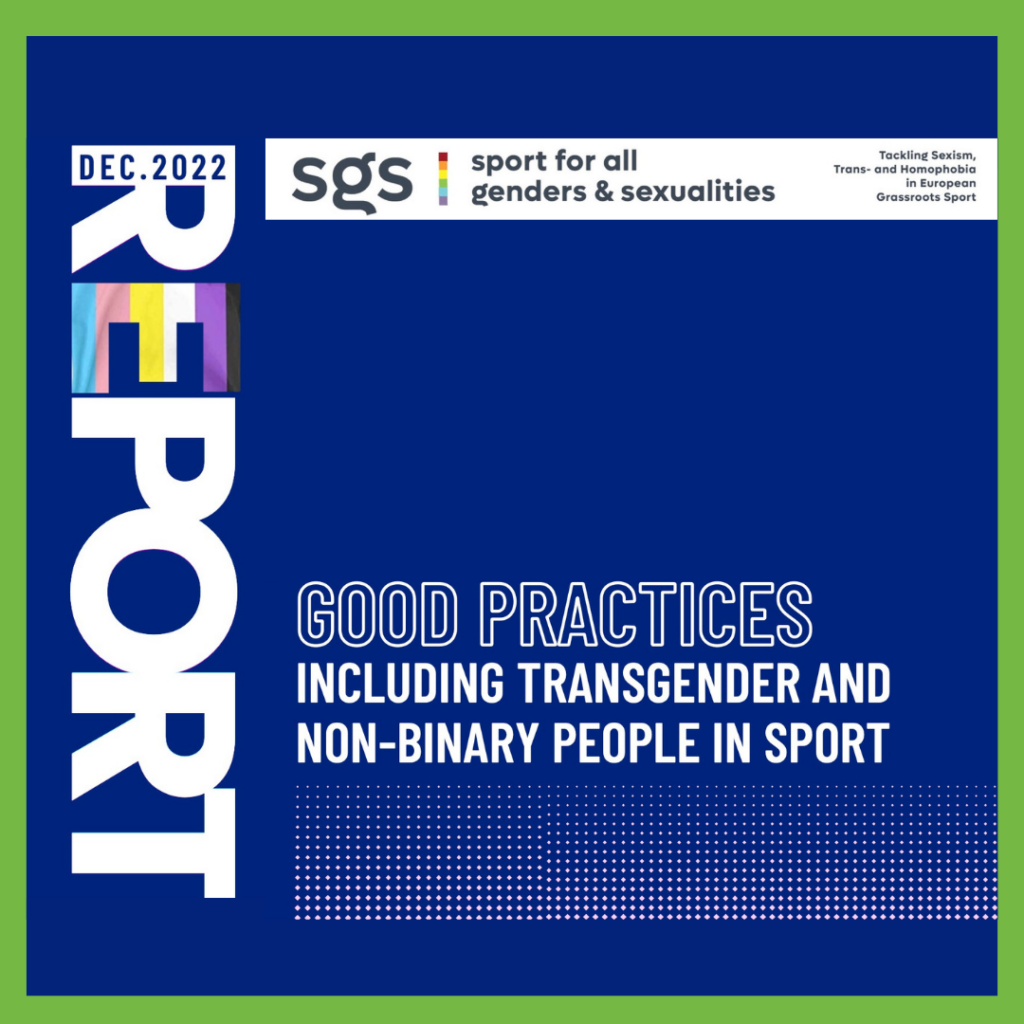Lerne mehr über 16 Good Practice-Beispiele aus dem europäischen Breitensport zur Inklusion von Trans*, Inter* und nicht binären Athlet*innen. Weil “Change starts from your pitch!”

Das 75-seitige Dokument enthält eine Sammlung bewährter Praktiken zur institutionellen Einbeziehung von Athlet*innen mit diversen Geschlechtsidentitäten in den fünf Partnerländern (Spanien, Italien, Österreich, Deutschland und Niederlande). In Form einer Analyse der aktuellen Situation soll dieser Bericht nationalen und internationalen Sportorganisationen helfen, die Notwendigkeit einer echten Inklusionspolitik zu erkennen und einen Anstoß zur Umsetzung einer solchen Politik zu geben.
Bei den gesammelten “guten Praktiken” handelt es sich um eine Vielzahl von Initiativen, Programmen und Aktivitäten zur Förderung der Inklusion von transgender, intersexuellen und nicht-binären Menschen im Sportkontext. Sie garantieren nicht nur den Zugang zum Sport, sondern schlagen auch ein dauerhaftes Engagement vor, um bestehende Barrieren für die Teilnahme, Sozialisierung und das motorische Lernen für alle Menschen im Sport jenseits eines binären Systems zu identifizieren.
Wer sich lieber online durch die Good Practices klicken möchte, hat die Möglichkeit sich auf unserer neuen Lernplattform fairplay education die Beispiele anzusehen. Dort finden sich die Initiativen in Form eines kleinen E-Learning-Kurses. Viel Spaß beim Entdecken!
- Download des Reports (Englisch): SGS_Report-Good-Practices_FINAL-1
- Zum Good Practice Online-Course : Klick dich durch 16 Good Practice Beispiele!
+++ Aus der Einleitung / From the introduction (ENGLISCH) +++
Transgender, non-binary and intersex people experience discrimination, restricted access and bullying in sport due to the boundaries of traditional divisions of women’s and men’s sport, as well as the lack of a binding policy for international sports federations that ensures bodily integrity and human rights. The project “Sport for all Genders and Sexualities” (SGS) aims to tackle discrimination and stereotypes against transgender, gender diverse and non-binary athletes and those with sex variations (e.g., intersex athletes). The overall goal is to establish an inclusive grassroots sport culture.
One of the project’s main outputs is a collection of good practices of institutional inclusion of gender diverse athletes in the five partner countries (Spain, Italy, Austria, Germany and the Netherlands), in order to help national and international sport organisations understand the necessity for real inclusion policies and practices that consider the specific needs of people who identify as trans and gender nonconforming.
These good practices
- show the difference that sports initiatives, federations and clubs can make to fulfil grassroots sport’s promise of being open to all
- provide practical steps and ideas of where to begin, which direction to take, and what to keep doing in order to move forward in the process of supporting the inclusion of different gender identities and gender expressions.
We recommend approaching this report in a global context, which will illuminate many sport organisations on the possibilities for implementing positive and structural changes, but also to take into account the type of sport activity and whether or not there is already a transgender policy in place at the national or European level, which will depend on whether the national legislation recognises transgender rights.
In this report, “good practices” will be used to describe diverse ways (initiatives, programmes, activities, policies, experiences, regulations etc.) of responding effectively and promoting the inclusion of transgender, intersex and non-binary people in the sport context. Good practices not only guarantee access to sport, but also propose a permanent commitment to identifying existing barriers to participation, socialisation and motor learning for all people in sport beyond binarism.
